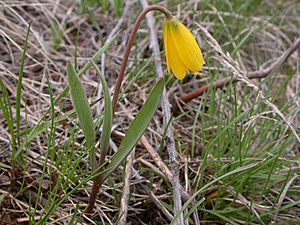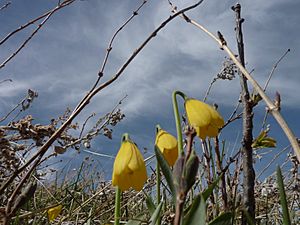Yellow fritillary facts for kids
Quick facts for kids Yellow fritillary |
|
|---|---|
 |
|
| Scientific classification | |
| Kingdom: | |
| (unranked): | |
| (unranked): | |
| Order: | |
| Family: | |
| Genus: |
Fritillaria
|
| Species: |
F. pudica
|
| Binomial name | |
| Fritillaria pudica (Pursh) Sprengel
|
|
| Synonyms | |
|
|
The yellow fritillary (scientific name: Fritillaria pudica) is a small, interesting plant. It is a perennial plant, which means it lives for many years. You can find it growing in the sagebrush areas of the western United States and Canada. It is also known as "yellow bells" because of its pretty, bell-shaped flowers.
This plant is part of the lily family, called Liliaceae. It is one of the first plants to bloom in spring. You can see its bright yellow flowers soon after the snow melts.
Contents
Where Does This Plant Grow?
The yellow fritillary likes dry, loose soil. It grows in many western states in the United States. These include Idaho, Montana, Oregon, Washington, Wyoming, and parts of California. You can also find it in Nevada, northwestern Colorado, North Dakota, and Utah. In Canada, it grows in Alberta and British Columbia.
Cool Facts About Its Flowers
The yellow fritillary has a unique flower. It starts as a bright yellow bell. But as the flower gets older, its petals change color. They turn a reddish-brown color, like a brick. The petals also start to curl outwards. This makes the flower look different as it ages.
A famous explorer named Meriwether Lewis found this plant. He collected a sample of it in Idaho in 1806. This was during his famous journey across North America.
A Food Source from the Past
The yellow fritillary grows a small bulb underground. This bulb can be dug up and eaten. People can eat it fresh or cook it. Long ago, Native Americans used these bulbs as an important food source. They were especially helpful when other foods were scarce.
Today, these plants are not as common as they used to be. Because of this, people are asked not to dig up the bulbs. This helps protect the plant so it can continue to grow in the wild. The plant has a special name in the Sahaptin language.
See also
 In Spanish: Fritillaria amarilla para niños
In Spanish: Fritillaria amarilla para niños
 | Stephanie Wilson |
 | Charles Bolden |
 | Ronald McNair |
 | Frederick D. Gregory |


